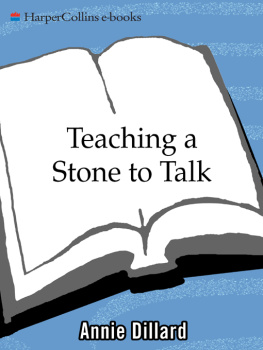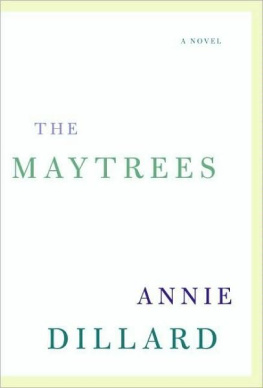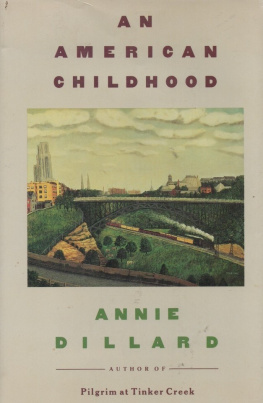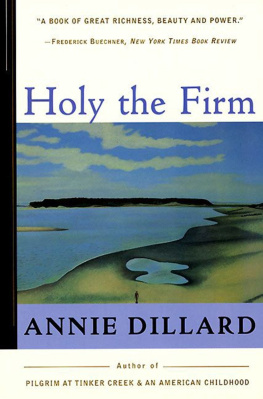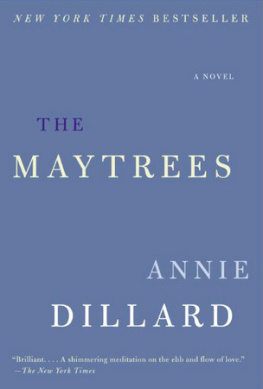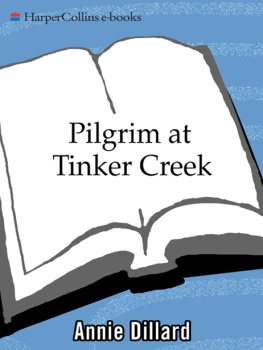Dillard - Teaching a stone to talk : expeditions and encounters
Here you can read online Dillard - Teaching a stone to talk : expeditions and encounters full text of the book (entire story) in english for free. Download pdf and epub, get meaning, cover and reviews about this ebook. City: New York, Pymble, NSW, year: 2007, publisher: HarperCollins e-books, genre: Art. Description of the work, (preface) as well as reviews are available. Best literature library LitArk.com created for fans of good reading and offers a wide selection of genres:
Romance novel
Science fiction
Adventure
Detective
Science
History
Home and family
Prose
Art
Politics
Computer
Non-fiction
Religion
Business
Children
Humor
Choose a favorite category and find really read worthwhile books. Enjoy immersion in the world of imagination, feel the emotions of the characters or learn something new for yourself, make an fascinating discovery.
Teaching a stone to talk : expeditions and encounters: summary, description and annotation
We offer to read an annotation, description, summary or preface (depends on what the author of the book "Teaching a stone to talk : expeditions and encounters" wrote himself). If you haven't found the necessary information about the book — write in the comments, we will try to find it.
Here, in this compelling assembly of writings, Pulitzer Prize-winning author Annie Dillard explores the world of natural facts and human meanings.
Dillard: author's other books
Who wrote Teaching a stone to talk : expeditions and encounters? Find out the surname, the name of the author of the book and a list of all author's works by series.
Teaching a stone to talk : expeditions and encounters — read online for free the complete book (whole text) full work
Below is the text of the book, divided by pages. System saving the place of the last page read, allows you to conveniently read the book "Teaching a stone to talk : expeditions and encounters" online for free, without having to search again every time where you left off. Put a bookmark, and you can go to the page where you finished reading at any time.
Font size:
Interval:
Bookmark:

For Gary
Some of these have not been published before; others, such as Living like Weasels and The Deer at Providencia, were published obscurely. At any rate, this is not a collection of occasional pieces, such as a writer brings out to supplement his real work; instead this is my real work, such as it is.
I
I T HAD BEEN LIKE DYING , that sliding down the mountain pass. It had been like the death of someone, irrational, that sliding down the mountain pass and into the region of dread. It was like slipping into fever, or falling down that hole in sleep from which you wake yourself whimpering. We had crossed the mountains that day, and now we were in a strange placea hotel in central Washington, in a town near Yakima. The eclipse we had traveled here to see would occur early the next morning.
I lay in bed. My husband, Gary, was reading beside me. I lay in bed and looked at the painting on the hotel room wall. It was a print of a detailed and lifelike painting of a smiling clowns head, made out of vegetables. It was a painting of the sort which you do not intend to look at, and which, alas, you never forget. Some tasteless fate presses it upon you; it becomes part of the complex interior junk you carry with you wherever you go. Two years have passed since the total eclipse of which I write. During those years I have forgotten, I assume, a great many things I wanted to rememberbut I have not forgotten that clown painting or its lunatic setting in the old hotel.
The clown was bald. Actually, he wore a clowns tight rubber wig, painted white; this stretched over the top of his skull, which was a cabbage. His hair was bunches of baby carrots. Inset in his white clown makeup, and in his cabbage skull, were his small and laughing human eyes. The clowns glance was like the glance of Rembrandt in some of the self-portraits: lively, knowing, deep, and loving. The crinkled shadows around his eyes were string beans. His eyebrows were parsley. Each of his ears was a broad bean. His thin, joyful lips were red chili peppers; between his lips were wet rows of human teeth and a suggestion of a real tongue. The clown print was framed in gilt and glassed.
To put ourselves in the path of the total eclipse, that day we had driven five hours inland from the Washington coast, where we lived. When we tried to cross the Cascades range, an avalanche had blocked the pass.
A slopes worth of snow blocked the road; traffic backed up. Had the avalanche buried any cars that morning? We could not learn. This highway was the only winter road over the mountains. We waited as highway crews bulldozed a passage through the avalanche. With two-by-fours and walls of plyboard, they erected a one-way, roofed tunnel through the avalanche. We drove through the avalanche tunnel, crossed the pass, and descended several thousand feet into central Washington and the broad Yakima valley, about which we knew only that it was orchard country. As we lost altitude, the snows disappeared; our ears popped; the trees changed, and in the trees were strange birds. I watched the landscape innocently, like a fool, like a diver in the rapture of the deep who plays on the bottom while his air runs out.
The hotel lobby was a dark, derelict room, narrow as a corridor, and seemingly without air. We waited on a couch while the manager vanished upstairs to do something unknown to our room. Beside us on an overstuffed chair, absolutely motionless, was a platinum-blond woman in her forties wearing a black silk dress and a strand of pearls. Her long legs were crossed; she supported her head on her fist. At the dim far end of the room, their backs toward us, sat six bald old men in their shirtsleeves, around a loud television. Two of them seemed asleep. They were drunks. Number six! cried the man on television, Number six!
On the broad lobby desk, lighted and bubbling, was a ten-gallon aquarium containing one large fish; the fish tilted up and down in its water. Against the long opposite wall sang a live canary in its cage. Beneath the cage, among spilled millet seeds on the carpet, were a decorated childs sand bucket and matching sand shovel.
Now the alarm was set for six. I lay awake remembering an article I had read downstairs in the lobby, in an engineering magazine. The article was about gold mining.
In South Africa, in India, and in South Dakota, the gold mines extend so deeply into the earths crust that they are hot. The rock walls burn the miners hands. The companies have to air-condition the mines; if the air conditioners break, the miners die. The elevators in the mine shafts run very slowly, down, and up, so the miners ears will not pop in their skulls. When the miners return to the surface, their faces are deathly pale.
Early the next morning we checked out. It was February 26, 1979, a Monday morning. We would drive out of town, find a hilltop, watch the eclipse, and then drive back over the mountains and home to the coast. How familiar things are here; how adept we are; how smoothly and professionally we check out! I had forgotten the clowns smiling head and the hotel lobby as if they had never existed. Gary put the car in gear and off we went, as off we have gone to a hundred other adventures.
It was before dawn when we found a highway out of town and drove into the unfamiliar countryside. By the growing light we could see a band of cirrostratus clouds in the sky. Later the rising sun would clear these clouds before the eclipse began. We drove at random until we came to a range of unfenced hills. We pulled off the highway, bundled up, and climbed one of these hills.
II
The hill was five hundred feet high. Long winter-killed grass covered it, as high as our knees. We climbed and rested, sweating in the cold; we passed clumps of bundled people on the hillside who were setting up telescopes and fiddling with cameras. The top of the hill stuck up in the middle of the sky. We tightened our scarves and looked around.
East of us rose another hill like ours. Between the hills, far below, was the highway which threaded south into the valley. This was the Yakima valley; I had never seen it before. It is justly famous for its beauty, like every planted valley. It extended south into the horizon, a distant dream of a valley, a Shangri-la. All its hundreds of low, golden slopes bore orchards. Among the orchards were towns, and roads, and plowed and fallow fields. Through the valley wandered a thin, shining river; from the river extended fine, frozen irrigation ditches. Distance blurred and blued the sight, so that the whole valley looked like a thickness or sediment at the bottom of the sky. Directly behind us was more sky, and empty lowlands blued by distance, and Mount Adams. Mount Adams was an enormous, snow-covered volcanic cone rising flat, like so much scenery.
Now the sun was up. We could not see it; but the sky behind the band of clouds was yellow, and, far down the valley, some hillside orchards had lighted up. More people were parking near the highway and climbing the hills. It was the West. All of us rugged individualists were wearing knit caps and blue nylon parkas. People were climbing the nearby hills and setting up shop in clumps among the dead grasses. It looked as though we had all gathered on hilltops to pray for the world on its last day. It looked as though we had all crawled out of spaceships and were preparing to assault the valley below. It looked as though we were scattered on hilltops at dawn to sacrifice virgins, make rain, set stone stelae in a ring. There was no place out of the wind. The straw grasses banged our legs.
Font size:
Interval:
Bookmark:
Similar books «Teaching a stone to talk : expeditions and encounters»
Look at similar books to Teaching a stone to talk : expeditions and encounters. We have selected literature similar in name and meaning in the hope of providing readers with more options to find new, interesting, not yet read works.
Discussion, reviews of the book Teaching a stone to talk : expeditions and encounters and just readers' own opinions. Leave your comments, write what you think about the work, its meaning or the main characters. Specify what exactly you liked and what you didn't like, and why you think so.

